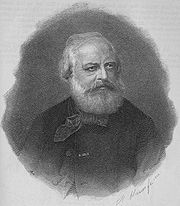
Julius Roerich Benedix
Encyclopedia

Germany
Germany , officially the Federal Republic of Germany , is a federal parliamentary republic in Europe. The country consists of 16 states while the capital and largest city is Berlin. Germany covers an area of 357,021 km2 and has a largely temperate seasonal climate...
dramatist and librettist, born in Leipzig
Leipzig
Leipzig Leipzig has always been a trade city, situated during the time of the Holy Roman Empire at the intersection of the Via Regia and Via Imperii, two important trade routes. At one time, Leipzig was one of the major European centres of learning and culture in fields such as music and publishing...
, where he was educated there at Thomasschule
Thomasschule zu Leipzig
St. Thomas School, Leipzig is a co-educational and public boarding school in Leipzig, Saxony, Germany. It was founded by the Augustinians in 1212 and is one of the oldest schools in the world.St. Thomas is known for its art, language and music education...
.
He joined the stage in 1831, his first engagement being with the travelling company of H. E. Bethmann in Dessau
Dessau
Dessau is a town in Germany on the junction of the rivers Mulde and Elbe, in the Bundesland of Saxony-Anhalt. Since 1 July 2007, it is part of the merged town Dessau-Roßlau. Population of Dessau proper: 77,973 .-Geography:...
, Köthen
Köthen (Anhalt)
Köthen is a city in Germany. It is the capital of the district of Anhalt-Bitterfeld in Saxony-Anhalt, about north of Halle.Köthen is the location of the main campus and the administrative center of the regional technical university Hochschule Anhalt which is especially strong in information...
, Bernburg
Bernburg
Bernburg is a town in Saxony-Anhalt, Germany, capital of the district of Salzlandkreis. It is situated on the river Saale, approx. 30 km downstream from Halle. The town is dominated by its huge Renaissance castle featuring a museum as well as a popular, recently updated bear pit in its...
and Meiningen
Meiningen
Meiningen is a town in Germany - located in the southern part of the state of Thuringia and is the district seat of Schmalkalden-Meiningen. It is situated on the river Werra....
. Subsequently he was tenor
Tenor
The tenor is a type of male singing voice and is the highest male voice within the modal register. The typical tenor voice lies between C3, the C one octave below middle C, to the A above middle C in choral music, and up to high C in solo work. The low extreme for tenors is roughly B2...
in several theatres in Westphalia
Westphalia
Westphalia is a region in Germany, centred on the cities of Arnsberg, Bielefeld, Dortmund, Minden and Münster.Westphalia is roughly the region between the rivers Rhine and Weser, located north and south of the Ruhr River. No exact definition of borders can be given, because the name "Westphalia"...
and on the Rhine, and became manager of the theatre at Wesel
Wesel
Wesel is a city in North Rhine-Westphalia, Germany. It is the capital of the Wesel district.-Division of the town:Suburbs of Wesel include Lackhausen, Obrighoven, Ginderich, Feldmark,Fusternberg, Büderich, Flüren and Blumenkamp.-History:...
, where he produced a comedy
Comedy
Comedy , as a popular meaning, is any humorous discourse or work generally intended to amuse by creating laughter, especially in television, film, and stand-up comedy. This must be carefully distinguished from its academic definition, namely the comic theatre, whose Western origins are found in...
, Das bemooste Haupt (1841), which met with great success.
After an engagement in Cologne
Cologne
Cologne is Germany's fourth-largest city , and is the largest city both in the Germany Federal State of North Rhine-Westphalia and within the Rhine-Ruhr Metropolitan Area, one of the major European metropolitan areas with more than ten million inhabitants.Cologne is located on both sides of the...
, he managed the new theatre at Elberfeld
Elberfeld
Elberfeld is a municipal subdivision of the German city of Wuppertal; it was an independent town until 1929.-History:The first official mentioning of the geographic area on the banks of today's Wupper River as "elverfelde" was in a document of 1161...
(1844-1845) and in 1849 was appointed teacher on the staff of the Rhenish school of music in Cologne. In 1855 he was appointed intendant of the municipal theatre in Frankfurt-on-Main, but retired in 1861, and died in Leipzig in 1873.
Benedix's comedies, the scenes of which are mostly laid in upper middle-class life, still enjoy some popularity; the best-known are: Dr. Wespe; Die Hochzeitsreise; Der Vetter; Das Lügen; Ein Lustspiel; Das Gefängnis; Der Störenfried; Die Dienstboten; Aschenbrödel; and Die zärtlichen Verwandten. The chief characteristics of his farces are a clear plot and bright, easy and natural dialogue. Among his more serious works are: Bilder aus dem Schauspielerleben (Leipzig, 1847); Der mündliche Vortrag (Leipzig, 1859-1860); Das Wesen des deutschen Rhythmus (Leipzig, 1862) and, posthumously, Die Shakespearomanie (1873), in which he attacks the extreme adoration of the British poet.
Benedix's Gesammelte dramatische Werke ("Collected Dramatic Works") appeared in 27 vols. (Leipzig, 1846-1875); a selection under the title Volkstheater in 20 vols. (Leipzig, 1882); and a collection of smaller comedies as Haustheater in 2 vols. (l0th ed., Leipzig, 1891); see Benedix's autobiography in the Gartenlaube for 1871.

